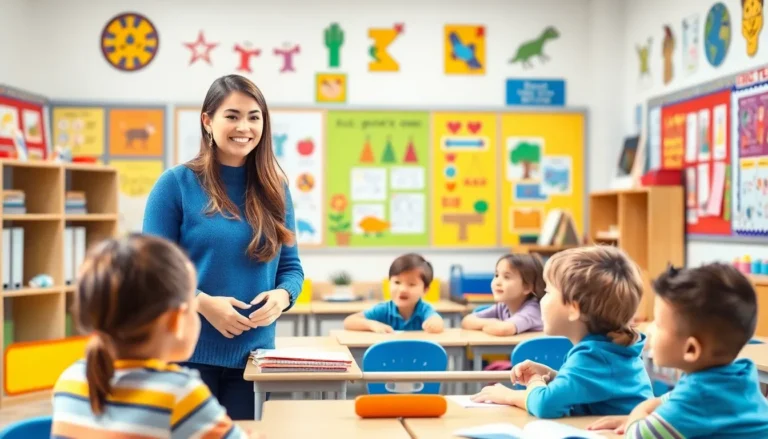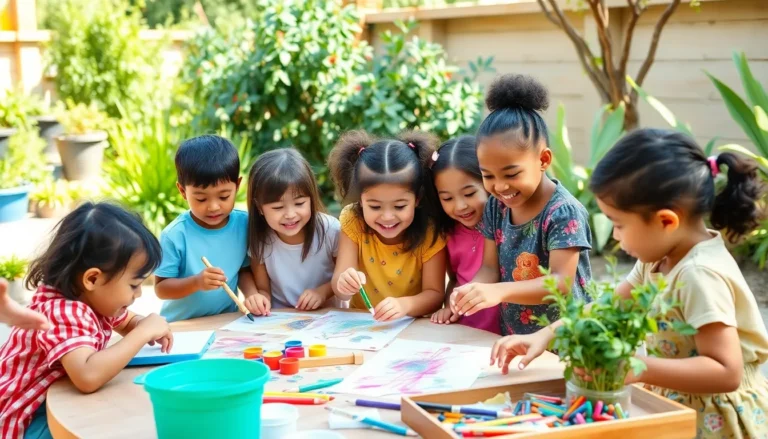Finding the perfect book for kids can feel like searching for a unicorn in a haystack. With countless titles out there, it’s easy to get lost in a sea of colorful covers and catchy titles. But fear not! The right book can ignite a child’s imagination, transport them to far-off lands, and even turn reluctant readers into bookworms.
Table of Contents
ToggleImportance Of Reading For Kids
Reading offers numerous benefits for children. It enhances vocabulary and language skills, allowing kids to express themselves more clearly. Early exposure to books can stimulate imagination and creativity, leading to innovative thinking in various subjects.
Additionally, reading boosts comprehension skills. Children learn to understand and interpret complex ideas through stories and characters. This understanding translates into better performance in academic settings.
Social skills also improve with reading. Engaging with characters helps kids develop empathy and perspectives beyond their own experiences. It fosters meaningful conversations about emotions, morals, and real-world situations.
Furthermore, reading can cultivate a lifelong habit. Children who read regularly demonstrate a greater appreciation for literature. This love for books often continues into adulthood and encourages a continued pursuit of knowledge.
Reading can reduce screen time, which is crucial in today’s digital age. By picking up a book instead of a device, kids can improve focus and concentration. This shift can also help develop critical thinking skills as they analyze plots or character motivations.
Reading draws children into different cultures and histories. Exposure to diverse narratives broadens their worldview and instills a sense of tolerance and understanding. In turn, this encourages acceptance of differences among peers.
Lastly, engaging with books can be a fun bonding activity for families. Shared reading time creates lasting memories and encourages discussions about various themes. Encouraging kids to read helps set them on a path toward success in education and beyond.
Criteria For Selecting The Best Books

Selecting the best books for kids involves several key criteria that enhance their reading experience. This selection process ensures both enjoyment and educational development.
Age Appropriateness
Age appropriateness plays a crucial role in book selection. Books should match a child’s developmental stage and reading level. For toddlers, picture books with simple text and vibrant illustrations captivate their attention. Early readers benefit from leveled reading materials that encourage independent exploration. As children grow, chapter books with engaging plots become suitable. Incorporating age-appropriate content ensures that kids remain engaged while developing their reading skills.
Engaging Storyline
An engaging storyline captures children’s interest and fosters a love for reading. Books featuring relatable characters and adventurous plots keep kids turning pages. Dynamic storylines that include elements of mystery, fantasy, or humor maintain attention and inspire imagination. For instance, series with ongoing character development encourage return visits to the stories. Stories that resonate emotionally help children connect with the characters, making reading a memorable experience.
Educational Value
The educational value of a book contributes to a child’s learning journey. Selecting books that introduce new concepts or reinforce curriculum subjects enhances comprehension. Language-rich texts expand vocabulary and improve language skills. Non-fiction books provide opportunities for children to learn about diverse topics, fostering curiosity about the world. Incorporating moral lessons encourages social development and critical thinking.
Top Picks For Various Age Groups
Selecting books for different age groups ensures that children remain engaged and stimulated. Below are recommendations tailored for specific developmental stages.
Picture Books For Toddlers
Bright colors and simple narratives capture toddlers’ attention. Titles such as Brown Bear, Brown Bear, What Do You See? by Bill Martin Jr. introduce vibrant illustrations and repetitive text. The Very Hungry Caterpillar by Eric Carle offers an interactive reading experience while teaching counting. These books enhance language skills through engaging repetition and encourage imagination with captivating stories.
Chapter Books For Early Readers
Early readers benefit from chapter books that build comprehension and fluency. Frog and Toad Are Friends by Arnold Lobel features relatable characters exploring friendship and adventure. Additionally, Magic Tree House series by Mary Pope Osborne invites children into imaginative journeys across time and space. These books foster independent reading habits and offer valuable lessons in each story.
Middle-Grade Novels
Middle-grade novels entice readers with more complex plots and themes. Harry Potter and the Sorcerer’s Stone by J.K. Rowling captivates children with an enchanting world filled with magic and friendship. Furthermore, Percy Jackson & The Olympians by Rick Riordan merges modern adventure with Greek mythology. Such novels enhance critical thinking and empathy, helping children connect with diverse experiences.
Tips For Encouraging Reading Habits
Encouraging reading habits in children fosters a lifelong love for books. Creating an inviting atmosphere and establishing a routine plays a vital role in this process.
Creating A Reading-friendly Environment
A reading-friendly environment promotes literacy. Designate a cozy area filled with cushions, good lighting, and accessible books. Fill shelves with a variety of titles, ensuring plenty of choices for different interests and ages. Consider incorporating colorful posters or art related to books to stimulate curiosity. Encourage children to personalize their space by letting them choose which books to display. A cluster of engaging decor can motivate kids to explore reading further.
Setting A Reading Routine
Setting a reading routine makes reading a regular part of life. Allocate specific times for reading daily, such as before bedtime or during meals. Treat storytime as a sacred family event, prioritizing it in the evening schedule. Kids benefit from consistency and structure, leading to better retention and engagement with what they read. Utilize timers or fun challenges to keep them motivated and avoid distractions. Celebrate milestones with rewards, creating excitement about reaching new reading goals.
Choosing the best books for kids can be a rewarding journey that opens doors to imagination and learning. By selecting age-appropriate titles with engaging storylines and educational value, parents can foster a love for reading that lasts a lifetime. Creating a nurturing reading environment and establishing routines further enhances this experience.
As children explore diverse narratives and characters, they not only develop vital skills but also gain empathy and understanding of the world around them. With the right books, every child can embark on a unique adventure that inspires curiosity and growth.






